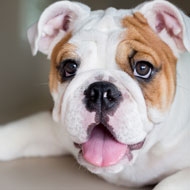Bulldogs’ tails give insight into rare human disorder

Bulldogs, French bulldogs and Boston terries all share a feature not found in other breeds - a short, kinked tail or “screw tail”.
Researchers in the US have made a link between the bulldog’s curly tail and a rare inherited disorder in humans.
Scientists from the University of California, Davis, School of Veterinary Medicine, found a common mutation in bulldogs and French bulldogs that is similar to genetic changes in the human disease, Robinow syndrome.
They believe that understanding this common mutation in these popular dog breeds could give more insight into this rare condition. The study has been published in the journal PLOS Genetics.
“It’s a very rare human disease but very common in dogs, so this could be a model for the human syndrome,” said professor Danika Bannash from UC Davis.
Bulldogs, French bulldogs and Boston terries all share a feature not found in other breeds - a short, kinked tail or “screw tail”. This is because all three breeds are missing the vertebrae that makes up the tail bone.
To learn more about the genetics associated with screw tail breeds, researchers analysed the genome of 100 dogs, of which 10 were screw tails.
From over 12 million individual differences, the researchers identified one mutation in a gene called DISHEVELLED 2 or DVL2. The variant was present in 100 per cent of the bulldogs and French bulldogs sampled, and it was also common in Boston terriers.
In humans, mutations in the related DVL1 and DVL3 genes are linked to Robinow syndrome - a disorder that causes a short, wide “babyface”, spinal deformities and short limbs - traits also shared by screw tail breeds.
The study also identified a key biochemical step in the pathway disrupted by the mutation, suggesting that a common molecular defect is responsible for the appearances of both Robinow patients and screw tail dog breeds.



 The Animal and Plant Health Agency (APHA) has updated its online reporting service for dead wild birds.
The Animal and Plant Health Agency (APHA) has updated its online reporting service for dead wild birds.